Olena Zelenska, First Lady of Ukraine © president.gov.ua
In February 2022, Europe witnessed its first military confrontation in decades. This local dispute, with its high potential for escalation and spill over, caused widespread concern. The threat persists, with many drawing parallels to the ominous atmosphere of the 1930s that preceded World War II. However, others argue that such a scenario is implausible in today’s world, asserting that contemporary wars are, in any case, far more intricate and multi-layered than those of eighty years ago.
Indeed, in today’s world, the image has significantly greater impact and influence than in the past. News and information disseminate rapidly, and victories can often be achieved beyond the confines of traditional battlefields.
Ukraine’s successful garnering of media support in the face of Russian aggression can be attributed not only to their persistent and creative presence across all information platforms and channels, but also to the empathetic response they elicited from ordinary people. This response was not just a result of the innate human tendency to support the underdog, but also a testament to the inspiring actions and reactions of both the Ukrainian people and their leaders, which resonated deeply both domestically and internationally.
President Volodymyr Zelenskyy’s initial response is now celebrated: ‘The fight is here; I need ammunition, not a ride!’. Whether these were his actual words or not is uncertain. However, their impact was to galvanise the local populace and elicit an unparalleled reaction and support from international public opinion and policymakers. This once again demonstrated the potency of words. Since the onset of this conflict, we have continually witnessed the effective use of soft diplomacy by Ukrainian leaders and others.
In a recent conversation with Viktoria Lialina-Boiko, who serves as the Deputy Director for Communication and Public Diplomacy at Ukraine’s Ministry of Foreign Affairs, she shared insights into their communication strategy and its evolution, particularly after February 2022.
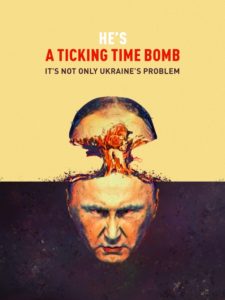
‘In 2021, together with the experts in communications we developed this strategy, for the first time for the MFA. We then defined the mission, our vision, main target audiences as well as the preferred and most effective channels of communications. This document considered all the lessons learned from communication challenges we had faced in times of crises, and it is still relevant now, during full scale Russia’s war against Ukraine. In January 2021, the official website of Ukraine — www.ukraine.ua — was launched. Before the war, this was primarily meant to promote Ukraine, its beauty and traditions, economic and tourism potential, to foreign audiences. The platform told an inspiring story about Ukraine, as everyone could get their first impression of the country’. (Viktoria Lialina-Boiko)
Through aspects such as customs, tourism, culinary arts, music, and economic opportunities, the website showcased the vast potential of the country. Ukraine.ua emerged as a potent voice across all social media platforms. With over a million followers on Instagram, it ranks among the top five official country accounts on this widely-used social media platform. It serves as an effective communication tool to connect with individuals worldwide.
‘After the full-scale war started, the website was no longer relevant in terms of information, as the public wanted to find out news about the war. So, in only one week, our partners and our team succeeded to create a new website, war.ukraine.ua — Ukraine’s official and verified digital platform launched to cover Russia’s invasion, now available in 9 languages.’ (Viktoria Lialina-Boiko)
The communication strategy astutely designated distinct communication channels of the MFA for various target audiences: Facebook primarily for the domestic audience, Twitter for public officials, and Instagram for the international general public.
‘We see the unprecedented attention to Ukraine and try to satisfy it with the most creative communication products.’ (Viktoria Lialina-Boiko)
Since the onset of the war, numerous international public figures have rallied to aid Ukraine.
A host of artists have participated in charity concerts worldwide, while others have backed various initiatives. Hollywood actor Liev Schreiber, whose maternal grandfather was a Ukrainian Jewish immigrant to the United States, has made several trips to Ukraine since last February and has formed a group to support organisations assisting Ukrainians. Alongside another renowned actor, Sean Penn, and several international athletes, he serves as an ambassador for www.United24.gov.ua. This official fundraising platform of Ukraine, launched by President Zelenskyy, has amassed over US$ 337 million to date.
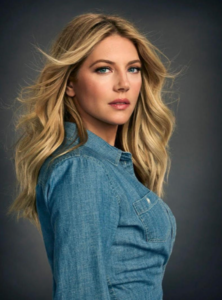
Canadian actress, film star, director, and producer, Katheryn Winnick boasts a captivating family history rooted in Ukraine. Her parents are the offspring of Ukrainian immigrants who initially relocated to Germany to escape the Soviet regime before eventually settling in Canada. Her maternal grandparents were born in Halychyna. Her paternal grandfather enlisted in the Sich Riflemen, even going so far as to claim he was two years older than his actual age to meet the eligibility requirements for service.
Katheryn Winnick has nurtured her Ukrainian heritage since childhood. Until the age of eight, she communicated solely in Ukrainian, attended a Ukrainian Sunday school in Toronto, and was a scout. On the 30th anniversary of Ukraine’s independence, Winnick made a visit to the land of her ancestors.
On February 24, 2022, the actress expressed her solidarity with Ukrainians across all her social media platforms, stating, ‘We are a peaceful nation. We do not deserve this war’. By March 2022, Winnick and her mother had established The Winnick Foundation, a charitable organisation dedicated to raising funds for Ukraine’s needs. Her journey then led her to become involved with UNITED24. As the platform’s first Canadian ambassador, she advocates for the “Rebuild Ukraine” programme.
‘A home is where a family comes together. It’s where love is shared, and memories are made. Rebuild Ukraine will rebuild not only homes but also families’, Katheryn Winnick shared.
These platforms, along with all other pillars of Ukraine’s public diplomacy strategy, have so far developed numerous image projects. For instance, on 21 December, the longest night of the year, a campaign was launched to highlight Ukraine’s current energy crisis to the general public. A remarkable number of iconic buildings worldwide, including the Colosseum in Rome, the Eiffel Tower in Paris, and the Sydney Opera House, were momentarily plunged into darkness. The accompanying message urged support for the Ukrainian population with electricity generators.
To rally support for the dispatch of Leopard tanks to the Ukrainian military, a “Free the Leopards” flash mob was initiated on the Ukraine.us Instagram account. Participants were invited to don leopard costumes or leopard print attire, and then share their photos with the appropriate tags. This innovative approach went viral, achieving widespread global attention.
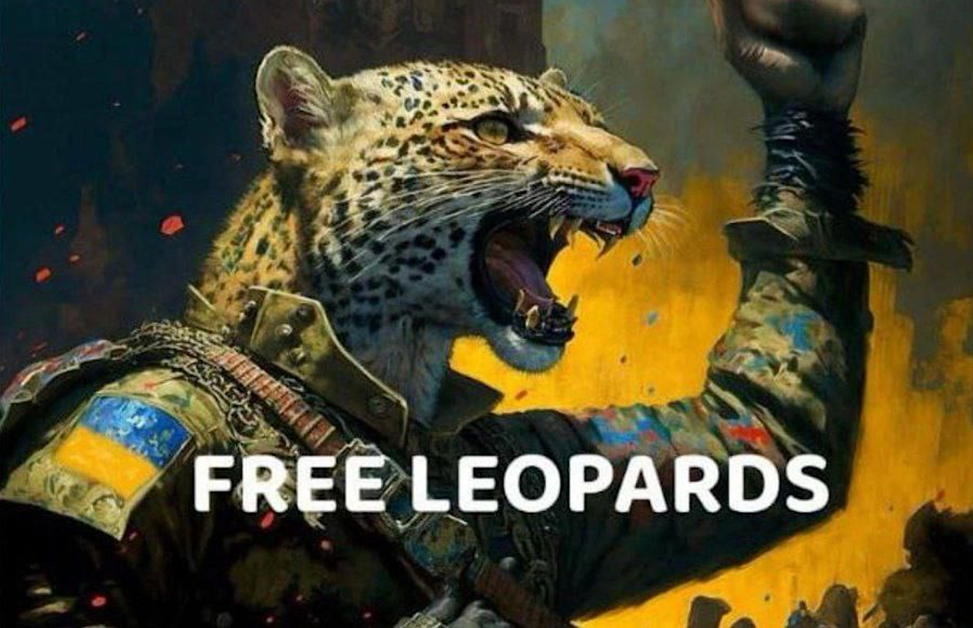
Another inventive initiative by the MFA, in collaboration with Saatchi & Saatchi Ukraine, involved reworking the lyrics of the renowned Christmas carol, ‘Carol of the Bells’. The original music for this song was composed by Ukrainian musician Mykola Leontovych in 1914. The revised version appealed for aid for children affected by the war in Ukraine, who could no longer enjoy a normal Christmas. Listeners were encouraged to use the Shazam App and then donate to the needs of Ukrainian children through the Olena Zelenska Foundation. This project has garnered several international accolades, including Silver and Bronze at the Cannes Lions International Festival of Creativity.
All these innovative approaches are designed to ensure the message reaches individuals of diverse backgrounds and geographical locations. The communication strategy of Ukraine has demonstrated its effectiveness, directness, and diversity. A fundamental component of this strategy is diplomatic activity, which, in addition to traditional and conventional methods, includes the involvement of spouses. This has proven to be a potent and intriguing promotional tool. The network of diplomatic spouses is extensive and can significantly enhance the visibility of actions. Ukraine has fully leveraged this and acknowledged its immense potential.
Tanya Sybiha, the spouse of Andriy Sybiha, who formerly served as a Ukrainian ambassador and is currently a top advisor to President Volodymyr Zelensky and deputy head of his office, shared with me their diplomatic endeavors and actions, particularly since the onset of the war: ‘It was in December 2021, three months before the war started, that we, the Ukrainian diplomatic spouses, had a first meeting with the First Lady of Ukraine, Olena Zelenska. This was a summit for the spouses of Ukrainian ambassadors at first. It eventually turned into a “Platform of the Ukrainian diplomatic spouses” involving all the spouses and designed to support them in their efforts at soft cultural diplomacy, and to enhance their presence on the international diplomatic stage. We are now already at our third Summit.’
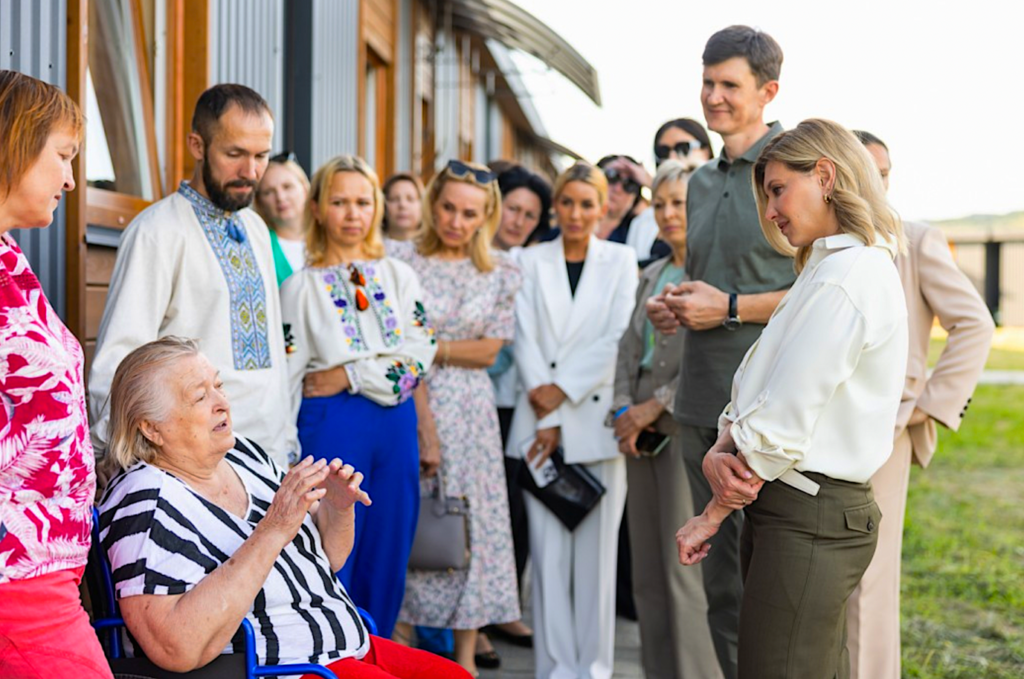
Tanya Sybiha, who previously served as a UN official and is currently a board member of the diplomatic spouses’ platform, explains that these meetings are also designed to equip the spouses with new tools: ‘We have lectures about communication and protocol, we discuss our official presence in different projects. We coordinate all the work, especially in Europe, together with our foreign ministry. It’s multifaceted and a platform where we all share our experiences or brainstorm for new ideas. Together with the Ministry of Foreign Affairs, we have public speaking workshops; we provide videos and other support material, to help with an efficient communication. When we connect our efforts, we are more successful. Culture is very important, it builds bridges. That is why I feel that it is so important to present our culture to the world. People need to learn more about our own traditions and long history. We, as spouses, do not have any formal role, but we are active and try to do our part. I have a saying: “You have to find your super-power and use it!” Well, our super power is in our voice, our actions.’ (Tanya Sybiha)
An illustrative example comes to mind. Last year, I had the opportunity to interview Maria Yemelianova, the spouse of a Ukrainian diplomat. She conceived the idea of launching a charity website offering cooking classes based on traditional Ukrainian recipes (www.ukrainian-taste.weblium.site). The website collects donations and is hosted on a free platform, Weblium, designed for volunteers and NGOs providing humanitarian aid to the Armed Forces of Ukraine.
One of the most publicised events in recent months, which stands as a testament to the totally successful efforts of these diplomatic spouses, was their visit to the Vatican. Initially, around 20 spouses of Ukrainian diplomats convened in Istanbul, where they met with Ecumenical Patriarch Bartholomew, the 270th Archbishop of the 2,000-year-old Church of Constantinople and a prominent figure in the Orthodox Church. Subsequently, these women and their children were granted an audience with Pope Francis at the Vatican, marking a first-time occurrence. In a private meeting that spanned nearly an hour and a half, Pope Francis, the leader of the Catholic Church, listened to their poignant testimonies and offered prayers for the well-being of Ukrainian children deeply affected by the war.
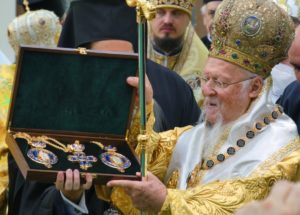
Svitlana Melnyk, the wife of the former Ambassador of Ukraine to Germany (January 2015 – October 2022), who holds a PhD in Law and is also a Senior Research Fellow at the Institute of State and Law of the National Academy of Sciences of Ukraine, was among the spouses present at this audience with the Pope. During their tenure in Berlin, she and her husband, the ambassador, were the foremost advocates for Ukraine, tirelessly championing their country’s cause in Germany. She explained that it was an intensely emotional experience that also conveyed a potent message; she is well-versed in such matters: ‘The last two years (2021-2022) of our diplomatic life in Berlin were extremely tense. Especially since April 2021, the ominous shadow of a full-scale war began to hang over Ukraine like a black cloud. We felt the approach of this artificial hurricane on our land. My husband, Ambassador Andriy Melnyk, tried to inform the German public about the ever-increasing threat of armed intervention by the Kremlin, using all available tools. The soft power of domestic diplomacy came in handy as I had to put aside all the classical tools, forget about the traditional methods which are at the disposal of an ambassador‘s spouse, and instead gather my own strength, relying primarily on creativity, experience, personal contacts, social networks and all other levers to help as much as possible, so that Ukraine could survive in those eerie times of blackout. The doors of our residence became wide open for the German media, where television crews or ordinary journalists could come at any time of the day to record an interview or comment with the Ambassador’.
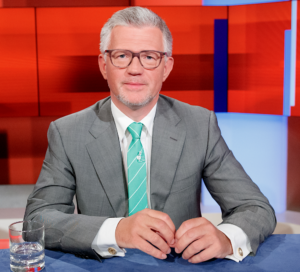
This trend continued until the last moment of our departure from Berlin. I was constantly preparing the room for filming in our residence and hospitably greeted German journalists. Often, they also wanted to hear my informal thoughts in order to better understand the complex international situation. I tried by all possible means to convey to them the feelings, position and thoughts of our people, the drama of the whole situation. My critical post on Facebook about the story of the provision of German helmets was widely distributed, also by the Russian media. That is when I also understood that defending our position publicly during the war will be associated with waves of discredit. However, it only testified that my open and public activity in covering events, the position of Ukraine, or explaining the actions of the ambassador on social pages, acts as an effective tool of soft power in diplomacy and on the information battlefield. In Berlin, many women, members of the diplomatic club, have launched active humanitarian activities to help Ukraine and our refugees since the beginning of the war. We often communicated during the first months of the war and supported each other in various humanitarian projects. Sometimes they were not so large-scale, but they were done from the heart and showed their solidarity, which became an invaluable support.’ (Svitlana Melnyk)
On the morning of the Russian invasion, the group of Ukrainian diplomatic spouses quickly reached out to each other to coordinate emergency actions. They agreed on a unified response and a collective declaration, which they disseminated on social media platforms, imploring the entire international community for assistance. Since then, they have wielded cultural diplomacy as one of the most potent weapons in modern warfare. They have organised charity concerts worldwide, featuring the talents of prominent Ukrainian artists they wished to showcase to the world. The First Lady of Ukraine personally endorsed several of these projects, delivering heartfelt welcome speeches to the attendees
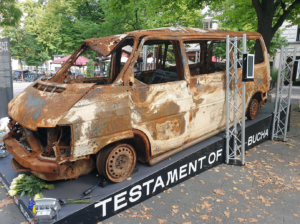
Svitlana Melnyk was at the heart of organising such an event in Berlin: ‘We held the first big concert already on March, 19 at the Berlin Philharmonic, with only two and a half weeks to organise. More than 1,200 seats were sold out. The brightest performers of classical music and opera, tenor Dmytro Popov, pianists Kateryna Titova and Oleksiy Botvinov and violinist Bohdana Pivnenko, beautifully performed music by Ukrainian composers.German society discovered Ukraine as a cultural nation in a completely new light. All the funds collected during the concert were transferred through the German branch of the Red Cross and directed to the creation of the Center for the Reception of Ukrainian Refugees in Tegel, Berlin. A month later, a unique gala concert of world ballet followed, with prima ballerina Yana Salenko. It raised funds for the purchase of a neurosurgical instrument for the hospital in Kropyvnytskyi. Another fantastic public diplomacy project that we, together with the volunteers, managed to carry out in Berlin, happened at the end of August 2022: the installation of the ‘Testament of Bucha’. On the central and famous Kurfürstendamm Street in Berlin, a burned minibus was brought from Bucha, in which three women and a 14-year-old girl had been mercilessly shot. This exhibition caused a colossal public resonance and a powerful media echo. (Https://testamentofbucha.com). Meanwhile, I had to answer the hundreds of letters that arrived daily at the residence, asking for support. These are busy times for all our diplomatic spouses’. (Svitlana Melnyk)
Indeed, each individual is actively contributing to this intricate communication puzzle, which
I am confident will serve as a case study for university students in the years to come. It has already been demonstrated that culture has emerged as a crucial battleground in modern warfare, and that innovative and targeted soft-power tools can sometimes outperform actual weapons in effectiveness. It certainly appears that these days, soft power is synonymous with Ukraine…

